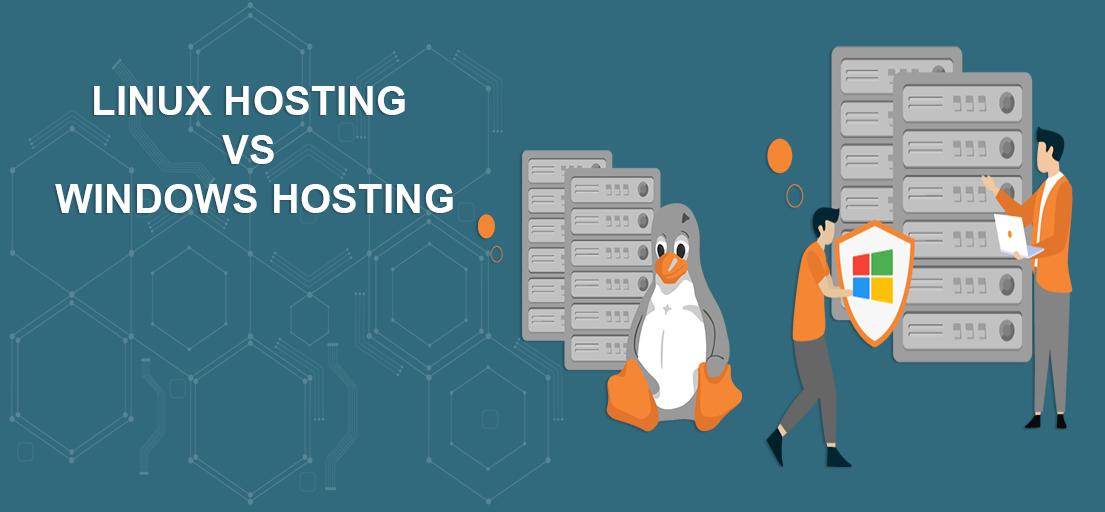Linux Hosting Vs Windows Hosting – Comparison
So this is the 20th query I have received about the differences that the operating system makes in web hosting life this week. The public feels so indecisive when choosing between Windows servers or Linux servers. Questions like why I should pick a Linux host or a Windows host resonate all the time.
So I wrote this comprehensive blog post about the differences between Windows hosting and Linux hosting. The main reading goal is to help you choose an operating system for your upcoming web project.
What Do Numbers Say?
Among the top 1 million servers globally, 96.3% are Linux users. Hardly 1.9% run on Windows. Numbers make the Linux winner. 83.1% of the developers say their preference is Linux.
Famous Companies Using Linux
- Oracle
- IBM
- Amazon
- DELL
- Samsung
- Microsoft
Famous Companies Using Windows
- Deloitte
- MIT
- GoDaddy
- Esri
- Verizon Wireless
Six Differences Between Linux Hosting & Windows Hosting
Most server administrators would agree that the first striking difference is stability. You rarely have to reboot a Linux server since many configuration changes do not require a restart. That is why we often consider Linux servers more stable than Windows servers.
On the other hand, Windows servers often lose stability when it comes to running multiple databases, websites, and file servers. Things get worse when you add separate applications and lots of scheduled tasks.
You May Also Like to Read: Linux Hosting & Windows Hosting
If you want up to 100% uptime, you should probably go for Linux servers. They also take the security lead. Most of the victims of Bitlocker attacks back in 2016, were Windows servers.
However, the learning curve for the management of Linux servers is steep. It won’t be a problem if you have the time or know-how to navigate a more complicated server. However, this could be daunting for those whose core job is not IT-related.
So maybe Windows is your go if you prefer simplicity or ease of use. Most of the answers are available online to help you solve your windows hosting problems.
Most Important Question
What software will you run?
The answer would clarify the situation instantly. Windows hosting UK is your ideal choice if the answer is an Exchange server or a Sharepoint site. However, if you love installing your favorite content management systems like WordPress or Joomla through cPanel, Linux is your go.
Let us dig deeper into the subject.
-
Operating System
Let’s begin with the first noticeable difference, the operating system that runs on the server. That makes the user interface notably different. Linux could turn out to be a nightmare for Windows users. The Linux realm of the command line with syntax and functions is strikingly opposite to the Windows realm of graphical menus.
So let us suppose you want to interact with the operating system itself. Going through a tool such as cPanel to install and update software and maintain databases is not your preference. It would be best if you went for a Windows server then. However, if you have a well-trained Linux administrator and can pay him, you can do otherwise.
We have discussed that Linux servers are more stable and secure. So Linux should be your top choice if you have to run a business-critical web application.
Hardware and software compatibility is also an operating system-specific factor. For example, suppose you work in a complex IT environment with many legacy applications and databases running on Windows servers. In that case, Windows hosting is a good option because it is a licensed operating system that they regularly update.
If you have system administrators already familiar with the OS, it means you require less training and enjoy more fantastic in-house support.
-
The Use Cases
Perhaps, the most common reason to look for a server is to set up a personal website, eCommerce site, blog, or online portfolio. For that reason, shared hosting on a Linux server is the best solution.
Most of them come with cPanel or Confixx. You get the simple web interface to install microblogging platforms, databases, and content management systems. They also have interfaces to configure email addresses and sometimes automatically manage Apache, PHP, MySQL, and FTP software packages. These all features make it perfect for beginners.
If you want to use Microsoft options such as Sharepoint or Hosted Exchange Servers, you must use Windows servers. Typically, large corporate environments deploy windows servers.
Are you an experienced web developer? Do you know how to configure an Apache or NGINX web server? Linux should be your choice, if yes.
-
Dev Tools & Control Panels
cPanel is a standard for small web server administration tools, and using it will make you understand why. Install just any software from the user interface. WordPress, phpBB, Joomla, Drupal, and Tikiwiki need one click to install. Security patches get into your system with most of them automatically.
So even with the basic skill level, you can directly jump into creating websites, blogs, bulletin boards, and wiki pages. cPanel is an incredibly beginner-friendly tool that helps you get things done faster without getting into the nitty-gritty.
Things like the creation and management of MySQL databases and PHP configuration are also super convenient. Setup new email addresses and adjust mailbox size limits quickly and flawlessly.
On Windows servers, we have a Plesk, which also is available for many Linux users. Many of the benefits are the same. You can run it on the Windows version of the LAMP (Linux, Apache, MySQL, and PHP) stack. Going deeper, Plesk even supports Docker, Git, and many advanced security extensions.
Amid Linux servers dominating the Apache, MySQL, and PHP market, it would be wise to highlight the unique tools of Windows servers.
The usage of Windows hosting servers with an IIS (Internet Information System webserver), MSSQL, and ASP.NET stack is very common. WebPI ensures the installation of all these tools simultaneously.
Working of Windows Web Application Gallery resembles cPanel. It has a free web application for blogging, content management, and more.
-
Databases, Domains, & Disk Space
For working in multiple domains, cPanel makes a good option. It becomes simple to manage disk space for more than one domain through a single host cPanel. Moreover, you can efficiently allocate more or less space to each client depending on the contract and their needs.
Most of the best web hosting UK companies prefer Linux as cPanel allows them to help their clients manage multiple domains through cPanel. A preconfigured MySQL server utilizing cPanel as the administrative portal makes a lot of web applications straightforward to deploy.
However, things again boil down to your situation. Linux with cPanel should be your pick if you work on your own external-facing site and your preference is a straightforward approach.
But if you work within the confines of a business with existing databases and interact with windows-based servers, opt for Windows hosting.
-
Security, Reliability, & Technical Support
Several online attacks have proved that despite Microsoft’s best efforts, Windows servers are still more vulnerable than Linux servers. Also, Linux takes the lead in reliability. There are Linux servers in the world that have not been rebooted in years.
As far as technical support is concerned, it depends on your choice of provider. Discuss your needs with support representatives and IT teams to ensure they have what you need.
-
Pricing
Linux wins that battle as well by offering more affordable prices. The reason behind that is the slow pace of change. Many Linux servers are running on the same hardware they were configured on almost a decade ago.
Check Linux Hosting Prices
For Linux, you can expect to pay less than five euros monthly (even one and a half euros), while for Windows, it can rise much higher than this.
Putting It All Together
In the end, the final decision depends upon your situation. Therefore, considering your business goals and needs is the primary conclusion. At The Email Shop, we provide state-of-the-art hosting solutions for both Windows Hosting and Linux Hosting with a variety of choices.









